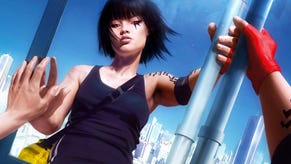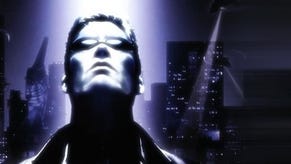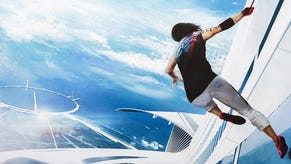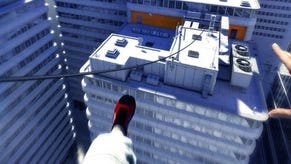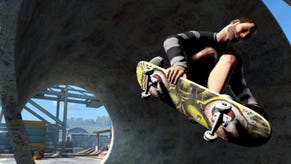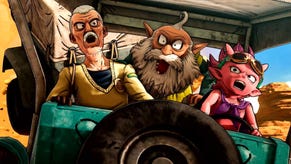Mirror's Edge
Runner up?
Well then, this is going to divide audiences down the middle. It's an ambitious game, but it manages to match its achievements with irritations at every turn; it's bold and forward-thinking, yet stilted and old-fashioned. Some will be able to overlook the gaping flaws, but others will never appreciate its moments of brilliance, and both positions are justifiable. Ultimately there's no right answer, but there are at least two things that prolonged exposure reveal: there are a handful of the crucial parts of a masterpiece here, and the end result still feels like a work in progress.
To start on a high point, you won't be mistaking Mirror's Edge for any other games until the inevitable clones emerge. Its world - huge blue skies, and massive bleached concrete vistas shot through with perfectly placed flashes of lurid colour - is beautiful, distinctive and inviting. Given the Swedish developer, we're already seeing Ikea jokes, but it's more of a city designed by Habitat: classy, solid, and perhaps gently self-involved. It's probably only a dystopia because the bed linen costs a fortune.
And the location is a powerful enough presence to make up for the story. Mirror's Edge tells of a gleaming CCTV hell where the only freedom lies with the Runners - sportswear renegades who dash about on rooftops screwing around with their clients' parcels, like Fed Ex run by Jason Bourne - and it's an intriguing idea, but the game is too breathless to explore it properly. Before you know it, someone's been framed for murder, someone else is upset about it, and you have damp shreds of a limp conspiracy to stitch together. The characters are forgettable, the plot points are so mindless you rarely notice what you're being sent off to do, and the voice acting is patchy. Faith, the strikingly designed lead, sounds like she's seconds away from offering you a timeshare with her anodyne Californian accent, and at least one other cast-member has been parachuted in from Top Cat.
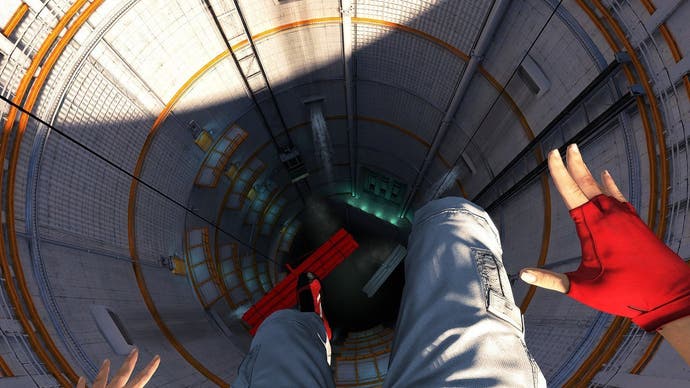
Portal demonstrated what a decent narrative can add to an idiosyncratic game, so it's a shame, but it's a missed opportunity rather than a deal-breaker. What's important is all the opportunities to dash about on rooftops, because this is the true gem at the core of Mirror's Edge: its in-body perspective and quirky control scheme proves that first-person platforming is far from heretical; it can actually be exhilarating, inventive and stylish. Like the very best of its genre, movement itself is fun, and when it works and you're dashing across the skyline, sometimes in control, sometimes barely winging it, Mirror's Edge is brilliant.
The control scheme initially seems lopsided, with the dominant context-sensitive up and down movements on the left triggers, but as soon as you start to trust the connection between controls and environment (the up button really will work out, whether you want to wall-run or just grab a ledge, and down will slide or roll judiciously), the tucks and swings and lunges fall into place. To aid you in stringing moves together, Runner's Vision paints useful bits of scenery bright red, pulling you along the best path without upsetting the game's palette.

When it's all going well, you move like an urban ballerina. When it gets fiddly, however, you feel like the Elephant Man trying rollerblades for the first time, and for the first half-hour at least, the learning curve is a straight line that plummets over the edge of a rooftop into swift oblivion. This early confusion is mainly because Mirror's Edge can feel like it's built from two conflicting impulses: the magic up/down triggers suggest that, as with Assassin's Creed, all the hard work will be done for you, but at the same time automatic course-correction for jumps and runs is absent. Unlike Tomb Raider or old-days Banjo-Kazooie, DICE rarely cheats on your behalf by nudging you that extra millimetre to the left to grab a drainpipe, or pulling you up short before you accidentally step into empty space. Even as you master the controls and learn the game's peculiarities, you're still going to spend a lot of time in Mirror's Edge falling off things and waiting through the (mercifully brief) reload.
While movement really just takes a bit of practice, combat is more of a mix-up. Hand-to-hand fighting's fun, with a pleasant timing element to disarming enemy coppers. Yet, oddly given DICE's Battlefield lineage, the shooting is drab, with sluggish aiming and a forgettable arsenal. Even though gunplay isn't the point - every weapon is an encumbrance that limits your movement, built to be used and quickly discarded - there's no reason to drive that home with half-hearted shooting.

